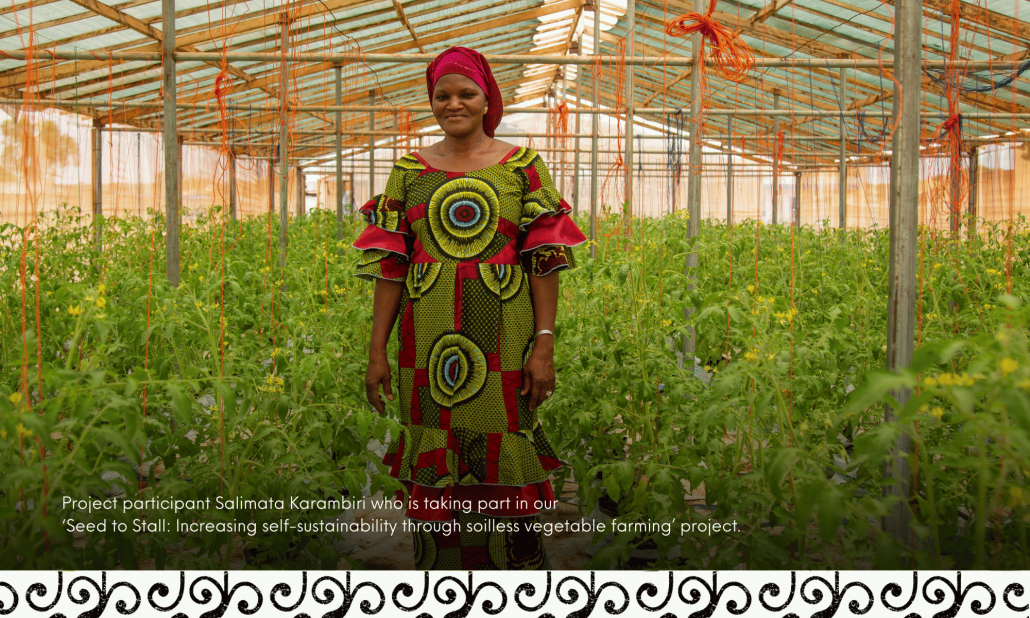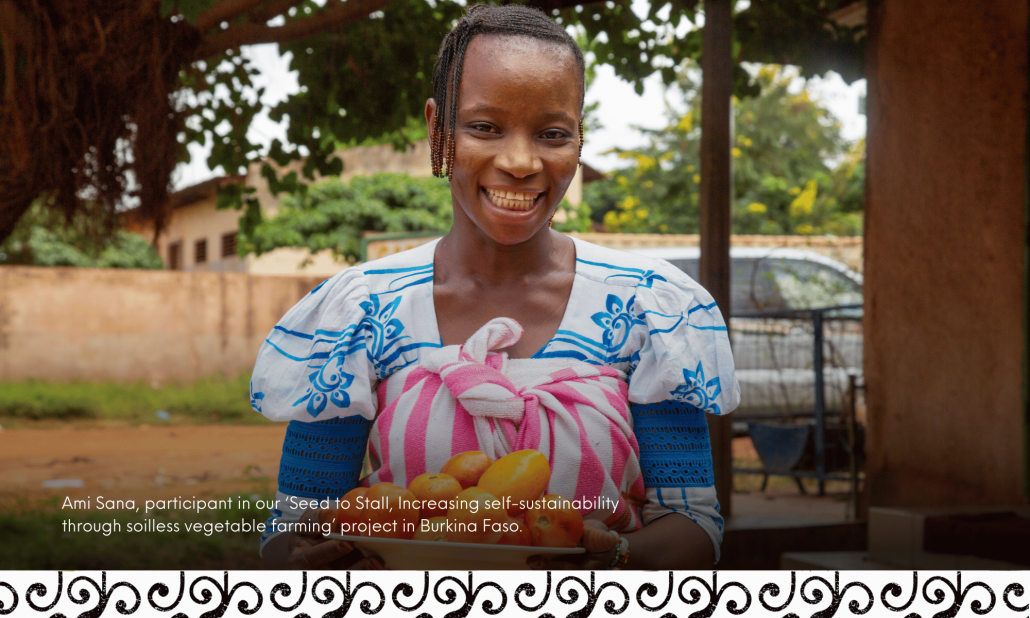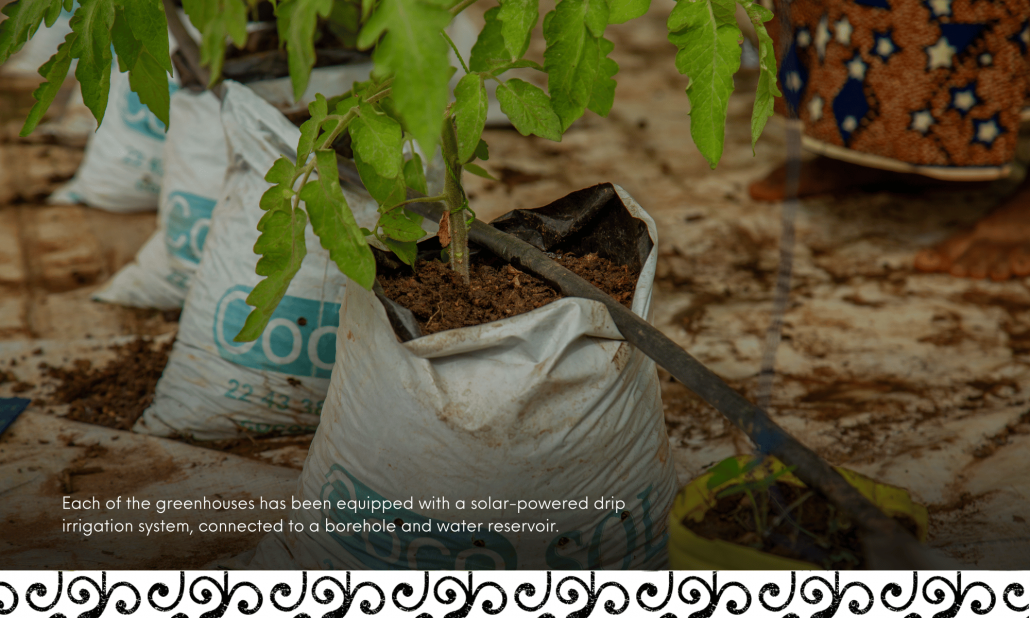Seed to Stall: Soilless Production Enterprise End of Project Report
02 October 2023
From September 2022 to August 2023, Shared Interest Foundation led a transformative farming project in Burkina Faso. 'Seed to Stall: Increasing Self-sustainability through Soilless Vegetable Farming' was a project which supported 200 economically vulnerable women living in the semi-urban areas located around the city of Bobo-Dioulasso, to increase their income through the production and sale of organic vegetables using an innovative soilless farming technique.
This technique uses readily available local materials instead of soil, including sawdust, coconut fibres and poultry manure, which retain water and release nutrients for plant growth.
The project carried three key objectives.
- To establish a 400m² soilless vegetable farm.
- To train and equip 200 women with the resources to grow vegetables using the soilless technique.
- To increase the income of 200 women from £18 to £37 so they are able to meet their family needs.
Access to land, climate change and limited knowledge of farming practices are barriers that prevent women living in these semi-urban communities from earning a meaningful income from agriculture. The soilless farming method is practiced on land unsuitable for traditional farming and requires less water, therefore enabling crops to be grown throughout the year and providing a sustainable and reliable source of income for women.
Project Partner
These projects were delivered in partnership with Platforme Nationale du Commerce Equitable Burkina Faso (PNCEB), the fair trade network of Burkina Faso, and Groupe d’Action des Femmes pour la Relance Economique du Houet (GAFREH), a women-led organisation based in Bobo-Dioulasso supporting over 6,000 women to become economically empowered. We would like to thank our funding partner Guernsey Overseas Aid for their support in the implementation of this project.

Establishing a 400m² soilless vegetable farm
A soilless vegetable farm was established across two greenhouses with a combined area of 400m². In the first month of this project, the local governor donated 8,000 m² of land for the construction of the greenhouses, providing the farm with the space to sustainably grow.
The whole site was fenced and each of the greenhouses were fitted with a solar panelled drip irrigation system connected to a borehole and water reservoir. In addition to providing a sustainable source of water for the farms, this borehole also serves the local community, which previously had no permanent access to water.
GAFREH estimates that between 100 and 150 households have accessed this water, each paying a social fee of 250 XOF (£0.32) per 200 litres - this is half the price charged by the government. With the income GAFREH have earned from this borehole, they have been able to employ a security guard and farm manager and constructed a small storeroom to store their farming equipment.
The farm has since generated significant local interest with orders being placed by local businesses and the local university canteen. The motorbike and storage crates purchased as part of this project transported vegetables to these buyers. Individuals also make purchases directly from the farm site. Based on sales, GAFREH estimate that over 13,800 people have consumed vegetables grown through this project.


Training and Equipping 200 Women to grow vegetables using the soilless technique
In November 2022, 200 members of GAFREH received training in the soilless farming technique, delivered by experts from Badoua Agro-business International with support from the Department of Rural Development and Agronomy from the University of Nazi Boni. Officers from GAFREH also attended the training to ensure they had the skills in place to continue supporting the women, and ensure more women are trained as the project grows.
The training covered all aspects of the production process including the maintenance of crops, application of liquid organic fertiliser, how to plan the farming calendar to meet production demand and the establishment and management of nurseries.
At the start of the project, a sample of 152 participants were assessed and 148 (97%) participants told us they had no knowledge of soilless farming.
Following the Project:
- Eighty-two per cent (165) of project participants rated their knowledge of farm management as high or very high.
- Eighty-five per cent (169) rated their knowledge of planting as high or very high.
- Seventy-four per cent (154) of project participants rated their knowledge of organic fertiliser production as high or very high.
Since the project started, an additional 46 women received peer to peer training in soilless production from lead farmers. These women are all internally displaced people (IDP) who were forced to leave their homes due to the ongoing conflicts in the north of Burkina Faso. All are now growing chilli peppers on the land outside of the greenhouses.
In May 2023, the group received training in agri-business, entrepreneurial skills and VSLA management to support the women to manage their farm business profitably and sustainably. Topics covered included farm management, income diversification, money and resource management and the benefits of being part of a saving scheme.
Following the training, the women were supported to establish Village Savings and Loans Groups (VSLA). Each women makes either a weekly or monthly contribution of between 200 XOF (£0.26) and 1000 XOF (£1.30) which is then available for the women to withdraw as a loan to meet household needs, or purchase farming inputs as required.
At the start of the project, 85% of the women (129) rated their business knowledge as low or very low, and 89% (136) of women kept no production volume or sales records.
Following the Project:
- 68% of participants (136) rated their business knowledge as high or very high.
- 97% of project participants (194) recorded production volume and 85% (170) recorded income.
Increasing the income of 200 women from £18 to £37 to meet their family needs
The producer’s monthly income has increased from an average of £19.90 (14,792 XOF) to an average of £74.30 (57,000 XOF).
Thanks to the income I receive here, I save it in our VSLA and I take the money to invest in the small business. It's a new activity that keeps me busy. Soilless farming has many advantages: you no longer pay for the products you produce, you consume organic vegetables to stay healthy and you don't need a lot of space to produce.
~ Boulguissa Mande | Project Participant
During the baseline data collection, 95% (190) of project participants reported that their income was never sufficient to meet their monthly living costs, whilst 82% (164) of project participants were never able to provide three meals per day for their family. 84% (168) of project participants also reported being dissatisfied or very dissatisfied with their quality of life.
Following the Project:
- 71% of women (142) say this is often enough to meet household needs
- 29% of women (58) always provide three meals per day.
- 85% of women (171) report they are somewhat satisfied or satisfied with their quality of life.

Additional Impacts of our Project
Advancing the Profile of Development Stakeholders
From its inception, this project gained local and national media interest and in February 2023, the project was visited by the national Minister for Solidarity and Humanitarian Action. This significantly raised the profile of soilless farming and of GAFREH, who are now consulted regularly by government for guidance and supported to deliver development projects in their region.
Generating Long Term Income for Households and Widows
The Burkinabé government has also selected soilless farming as an income generating activity for women who lost their husband during the recent and ongoing instability. In consultation with GAFREH, these groups will be supported to establish their own small farms to grow produce, increasing household food security and sell on the local market.
Increased Access to Water
The construction of the borehole has also been a key project success, providing vital support to the wider community. The area where the greenhouses are located is not part of the development plans for Bobo-Dioulassou and so has no government infrastructure. The borehole provides access to affordable water for people who otherwise would have to travel long distances to access it, especially the internally displaced people who live mainly in this area.
Developing Robust Skillsets and Support Networks
Toro Salifou, the Project Co-ordinator for PNCEB commented that a key success of this project is how quickly the women have mastered new skills enabling them to establish a new source of income. He also commented how the project has promoted social cohesion amongst the women who have now developed self-help and peer to peer support groups.
Strengthened Relationships with Educational Institutions
The success of the farms also enabled GAFREH to strengthen their relationships with local universities who have arranged for some of their students to visit the project on internships to learn about soilless farming methods to complement their theoretical studies.
“The project has given visibility to GAFREH both locally and nationally. The Central Government, through the Minister of Social Action, has requested GAFREH to help train internally displaced persons and other vulnerable groups to go into soilless farming”
~ Zeynab Ouedrago | Project Officer at GAFREH